a movement research in collaboration with iris yi po chan (2024), anso kristiansen (2019 & 2022), kim chi le (2022 & 2024) & duane nasis (2024)
Don't wanna be here? Send us removal request.
Text
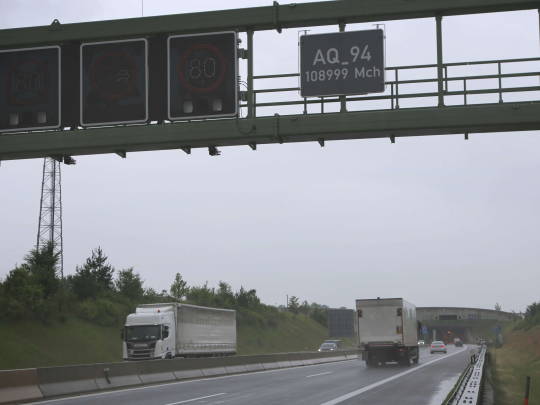
26 jul 2024 | project presentation at t (r) anzkultur summer school: choreographing diaspora in a transnational landscape (heinrich heine university, düsseldorf)
presentation abstract:
39 Minor Movements is a movement research project that reckons with the precarity of moving in the wake of racialised loss in the East and South East Asian diasporas under British border imperialism. Responding to the deaths of 39 Vietnamese migrants found in the trailer of a lorry in 2019, as dance practitioners we were confronted by the distance and proximity between 2 incommensurable techniques of passing—in the dance studio and in the refrigerated trailer. How do we move with the migrants across our dissimilar social locations in relation to global capital accumulation and its colonial underpinning? At the impasse of the liberal modernist imagination that equates mobility with freedom, what does it mean to attend to such movements bound to unfreedom in the realms of migrate justice as well as diasporic choreographic practice against UK Home Office’s decade-long hostile environment policy and its ongoing imperial formation?
image: the a94 highway in ampfing, east of munich in germany near the austrian border, where 7 syrian and turkish migrants were killed in a high-speed crash in october 2023 as the van that carried them sped up to evade a police check. (image credit: ovb online.)
[image description: a photograph of a highway with vehicles.]
0 notes
Text
border abolition / errant mobilities
introduction to phase #3 (apr 2024)
borders shape us. they shape how we move. they dictate the meanings and experience of our departure and arrival, ending and beginning, life and death. borders impose imaginary boundaries around the otherwise messy relationships we have with people, places and histories. borders immobilise as mush as they drive us. yet borders themselves move, too. they are established and dissolved, drawn and redrawn. yet part of their authority is derived from the way their impermanence is concealed. borders break bodies and kinship. they facilitate the traffic of precarious labour on the one hand, and oversee the accumulation of value through exploitation on the other. as east and south east asian diasporic movement practitioners who move in the aftermath and afterlife of the british empire, what other registers of movement are possible beyond these fictive architectures of partition and punishment? what other errant paths and aberrant becomings can we practice in the face of border imperialism and its kinetic apartheid?
responding to the ongoing urgency of reckoning with the deaths of 39 vietnamese migrants who crossed the english channel in the cargo of a lorry in 2019, this iteration of "39 minor movements" carries forward the work of mourning in motion in the wake of racialised loss while connecting it to the larger conversations on the historical expansion of the british border regime -- as well as the futures of its abolition. it means to recognise that essex 39 is not exceptional, but one of the most recent instances of state and economic violence via immigration control which, for legal scholar nadine el-enany, stands "on a continuum of colonialism." in particular, we turn to the deaths of 23 chinese migrant workers in the cockle fields in morecambe bay, lancashire, in 2004 -- as our movement research coincides with the 20th anniversary of the incident. over conversations on racialisation, labour exploitation and postcolonial inequality, and through writing, improvising and dance making, we posed questions about our positionalities under british border imperialism, drew connections to the border regime in occupied palestine and wondered about abolitionist futures where borders become obsolete.
(this phase of research is partially supported by swindon dance’s associate artist programme.)
0 notes
Text
composition practice: iris's score, "split apart" -- in a cluster (25 apr 2024)
note: due to some technical issues, the footage was recorded with glitches – discontinuous and choppy – serving now as a lens through which our movements are perceived and registered.
0 notes
Text
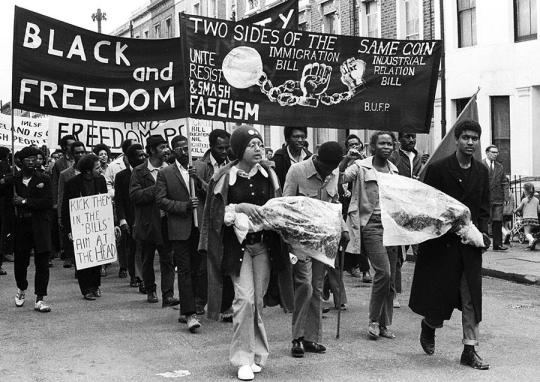
excerpts from the introduction to bordering britain: law, race and empire by nadine el-enany (2020)
"The notion of the unjustly enriched migrant has long been at the heart of British immigration policy. It is spurred on by a widespread and concerted refusal to understand contemporary British politics in the context of Britain’s colonial history... Absent from mainstream political discourse is any acknowledgement that the making of Britain’s modern state infrastructure, including its welfare state, was dependent on resources acquired through colonial conquest."
"The 2017 Grenfell Tower fire and the 2018 Windrush scandal are illustrative of Britain as a domestic space of colonialism in which the racialised poor find themselves segregated and controlled, vulnerable to deprivation, exile and death. The abstraction of day- to-day life in Britain from its colonial history means that immigration law and policy, whether in the form of the hostile environment, visa requirements or other external border controls, are not seen as ongoing expressions of empire. Yet this is what they are; part of an attempt to control access to the spoils of empire which are located in Britain. British colonialism is thus an ongoing project, sustained via the structure of law. It is Britain that has been unjustly enriched through centuries of colonialism, and immigration law is the tool that ensures that dispossessed peoples have no claim over what was stolen from them."
Britain's healthcare system, welfare state, transport infrastructure, cultural and educational institutions, battered and unequally accessible as they are in the wake of privatisation and austerity policies, are colonially derived, along with the private wealth amassed over the course of the British Empire and retained after its defeat via systems of inheritance."
"Britain’s borders, articulated and policed via immigration laws, maintain the global racial order established by colonialism, whereby colonised peoples are dispossessed of land and resources. They also maintain Britain as a racially and colonially configured space in which the racialised poor are subject to the operation of internal borders and are disproportionately vulnerable to street and state racial terror. Britain is thus not only bordered, but also racially and colonially ordered, through the operation of immigration control."
"The 1960s, 1970s and 1980s are particularly important decades in the story of immigration law and the making of modern Britain. Over the course of these decades immigration law played a crucial role in Britain’s transition from an empire to a sovereign, bordered nation- state. As colonial populations drove the British from their territories, winning their independence, British politicians were forced to come to terms with the defeat of the British Empire. The myth of imperial unity and equality was fast abandoned by British lawmakers as they moved to introduce controls targeted at racialised subjects and Commonwealth citizens. This legislation culminated in the 1981 British Nationality Act, which raised for the first time the spectre of a post-imperial, territorially defined and circumscribed Britain. It severed a notionally white, geographically distinct Britain from the remainder of its colonies and Commonwealth."
"The move was both materially and symbolically significant. A territorially distinct Britain and a concept of citizenship that made Britishness commensurate with whiteness made it clear that Britain, the landmass and everything within it, belongs to Britons, conceived intrinsically as white... The effect of the 1981 Act along with changes to immigration legislation in the course of the 1960s and 1970s was to put the wealth of Britain, gained via colonial conquest, out of reach for the vast majority of people racialised through colonial processes, most of whom had geographical or ancestral histories of British colonialism. The 1981 Act did not signify an end to British colonialism but was itself a significant colonial manoeuvre. It was an act of appropriation, a final seizure of the wealth and infrastructure secured through centuries of colonial conquest. British immigration law, in serving to legitimise ongoing theft of colonial wealth, must therefore be understood as being on a continuum of colonialism. It is through immigration law’s policing of access to colonial spoils that the racial project of capitalist accumulation is maintained, a project which I argue is legitimised through judicial rulings in immigration and asylum cases."
image: protest against the anti-immigration bill and anti-industrial relations act organised by the black unity and freedom party, notting hill gate, london, 1971 (chris davies via frieze magazine)
[image description: a photograph of a group of black people marching down the street holding 2 large banners above their head that read: "two sides of the same coin. immigration bill. industrial relation bill. unite, resist & smash fascism. b.u.f.p." and "black and freedom." also in the crowd is a smaller poster that reads "kill them in the 'bills.' aim at the head."]
0 notes
Text
composition practice: duane's score, "(all-)consuming" (25 apr 2024)
0 notes
Text
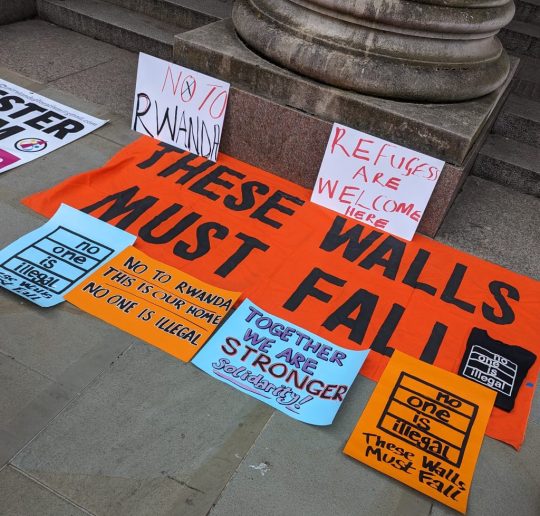
excerpts from "economic migration: the root problem is not smugglers but global inequality" by seb rumsby in the conversation (4 feb 2022)
"[W]hile smugglers do contribute to undocumented migration, the root cause is actually global inequality. This inequality is reproduced and perpetuated by many multinational companies within a wider economic system that serves to directly benefit the most wealthy and, indirectly, industrialised countries, at the expense of others."
"A report from 2017 found workers at a Samsung factory in Vietnam reported extreme fatigue, fainting, dizziness and even miscarriages due to poor working conditions... Meanwhile, Samsung has made huge profits in Vietnam. This happens all across the world: multinational corporations take advantage of cheap labour in poorer countries through global supply chains."
"Multinational corporations represent a continuation of historical exploitation and wealth flow from developing countries to Europe under colonialism, which funded the west’s dramatic rise to prosperity in the first place. In an unequal world, it makes sense for those in poorer countries with limited options to follow the money to a more developed country, find a low-skilled job, work hard and then send some money back home. This may lead Vietnamese migrants to Japan, Taiwan, South Korea, Germany – or all the way to the UK. Such movement, however, is often forbidden, forcing people to risk potentially deadly border crossings under the radar."
"In fact, considering the mass exploitation of Vietnamese labour by foreign corporations (which has exacerbated global inequality), it could be argued that economic migration is a matter of justice and that it’s only fair and reasonable that migrants should seek a portion of the extracted labour value that should have stayed in Vietnam. So if we really want to reduce migration, we must treat it as an inevitable by-product of inequality and address the root causes – instead of simply blaming smugglers or washing our hands of the migrants’ plight."
image: protest against the "safety of rwanda (asylum and immigration) act" passed in apr 2024 via right to remain
[image description: a photograph of several protest signs of various colours placed on the floor on the street. the signs read: "no to rwanda," "refugees are welcome here," "these walls must fall," "no one is illegal," "this is our home," "together we are stronger, solidarity!"]
0 notes
Text
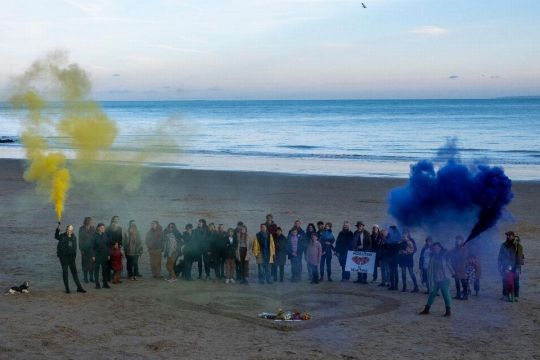
excerpts from "uk border crossings: 20 years of dying in lorries but still ‘no change’" by maël galisson in open democracy (13 feb 2024)
"'The majority of the 39 victims of this deadly crossing come from regions that are not only the least developed in the country, but also the most vulnerable to climate change,' said Danielle Tan, an independent researcher who has studied Vietnamese migrants stranded on the French-British border."
"'The next day, we decided to hold a vigil outside the Home Office in London. There was a lot of anger and sadness, particularly in the east and southeast Asian diasporas,' said Kay Stephens, a member of the Remember & Resist collective that was formed in the wake of this tragedy. Other commemorations took place across the UK, from Belfast to Glasgow. 'The media and the authorities were quick to point the finger of blame at the smugglers,' Stephens said. But 'to see the home secretary, Priti Patel, say on Twitter that she is ‘shocked and saddened’ is to forget that these deaths are above all the consequence of the hostile environment policies deployed by the British authorities.'"
"During the vigil in front of the Home Office, 'a Chinese community activist, Jabez Lam, took the floor and recalled that, 20 years earlier, 58 Chinese migrants had died in similar circumstances,' Stephens said. Customs officers at the port of Dover discovered the bodies Lam was referring to on 18 June 2000. Like the 39 migrants from Vietnam, these were also in a trailer loaded onto a ferry at Zeebrugge."
"'The same policies continue to be pursued, so there's obviously a strong resonance between these two events,' Stephens said... In December 2001, 13 people left Zeebrugge hidden in a container bound, they thought, for Dover. Four days later the container was opened in Waterford, in the south of Ireland. Eight were dead, and the rest were perilously close to it."
"In the UK, this investigation led to the conviction of 11 people, including the truck driver, who was sentenced to 18 years in prison for manslaughter. Eighteen people were punished in Belgium, including cab drivers and the owners of homes through which victims had passed. In Vietnam, four convictions for human trafficking were handed down. Most recently, in November 2023, 18 people were given jail sentences of up to 10 years in France, including several cab drivers.
"But, seen from Vietnam, 'the death of these 39 exiles didn’t change anything,' [Mimi] Vu said, [an independent expert on human trafficking in Vietnam]. 'The main consequence has been an increase in the cost of the journey.' Before October 2019 the price to reach Western Europe ranged between £13,000 and £27,000 she said, but now it can reach £43,000. 'The more risks smugglers take, the higher the cost of passage,' Vu said."
image: "kent anti-racism network organised a vigil for the 39 people found dead in a lorry in essex on sunny sands beach in folkestone" (andy aitchison for kent live)
[image description: a photograph of a vigil at a beach. people stand roughly in a line in front of a large heart shape drawn in the sand that has the number "39" written inside of it. on both ends of the line, there are people who lit up smoke grenades as colourful smokes rise up to the sky. behind them, the ocean and the sky just before dusk.]
0 notes
Text
composition practice: june's score, "desire to stay" (25 apr 2024)
0 notes
Text

excerpts from the introduction to against border: the case for abolition by gracie mae bradley & luke de noronha (verso books, 2022)
"Immigration controls do not prevent human movement, nor do they protect citizens. In fact, borders produce many of the social harms they claim to prevent, including loss of life, inhuman and degrading treatment, and rampant inequality. Borders fail to address the conditions that shape migration processes in the first place – global inequalities, the dispossession of lands and livelihoods, climate breakdown – and they render people on the move vulnerable to various forms of exploitation and abuse. Immigration controls cannot be used to protect people’s rights or to alleviate global inequality; they only ever worsen these problems."
"Echoing Angela Davis in her account of prisons, we contend that immigration controls are obsolete and should be abolished. Borders and prisons are both punitive systems for managing undesirable subjects, and both punish people through immobilisation and forced exile. Whatever the important differences between prisons and borders, state violence is in both cases directed towards managing and restricting movement. The struggle for freedom is therefore in both cases a struggle over movement – a struggle for the right to locomotion, to move freely, over fences and out of cages."
"What we call border abolition is concerned with expanding this freedom, the freedom to move and to stay. This does not mean advocating for free movement in the world as it is currently configured, but rather for transformation of the conditions to which borders are a response. Abolition is concerned with presence (the presence of life-sustaining goods, services and practices of care) as well as absence (of violent state practices like detention and deportation). Accordingly, border abolition seeks to dismantle violent borders, but also to cultivate new ways of caring for one another, nurturing forms of collectivity more conducive to human flourishing than the nation-states we currently inhabit. Border abolition is a revolutionary politics situated within wider struggles for economic justice, racial equality and sustainable ecologies, based on the conviction that there will be no liveable futures in which borders between political communities are violently guarded."
…
"Clearly, border abolition is easier said than done. The realisation that the one thing we need to change is everything can certainly be overwhelming. How do we fight to close detention centres and end deportations, stop transnational corporations ruining lives and destroying the planet, while at the same time nurturing spaces of sanctuary and safety in our neighbourhoods? How can we reduce the purview of surveillance, big data and algorithms, while at the same time developing new forms of intimacy beyond the family – all at a time when disaster nationalism seems to be extending its hold over popular political imaginaries? Though the road is long, we should recognise the hopeful signs around us – developments already in motion – and think about the strategies that can build on this work. We need to keep imagining and building, even as despair shadows hope."
image: naomi gennery for shado magazine
[image description: a graphic made with a collage of pictures and texts. at the center stands a head-scarf wearing adult holding hands with a child, shown from their backs. they appear to stand in the palm of a giant hand. around them are barbed wires in curved and straight lines. between the barded wires are several pictures of chain link gates and an airplane as well texts that reads "neglected," "visa" and "no border."]
1 note
·
View note
Text
composition practice: iris's score, "split apart" -- solo (25 apr 2024)
note: due to some technical issues, the footage was recorded with glitches – discontinuous and choppy – serving now as a lens through which our movements are perceived and registered.
0 notes
Text
composition practice: kim chi's score, "(never) arriving" (25 apr 2024)
note: due to some technical issues, the footage was recorded with glitches – discontinuous and choppy – serving now as a lens through which our movements are perceived and registered.
0 notes
Text
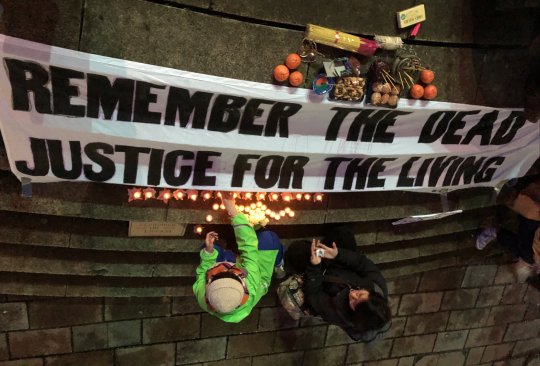
excerpts from "the essex lorry tragedy and the narrative of migration" by lam le in new naratif (26 nov 2019)
"The last time these provinces [Nghe An and Ha Tinh of north central Vietnam] made headlines internationally was in 2016, when a toxic spill from the Taiwanese steel plant Formosa killed over 100 tonnes of fish alongside 200km of Vietnam’s coastline. The government itself estimated it would take a decade for central Vietnam to completely recover from this catastrophe."
"While the narrative of poverty and environmental destruction was sufficient to draw sympathies in the UK, this, as told by the media, was in essence a Vietnamese tragedy. What was missing was a consideration of rising global inequality, where money, rather than humanity, talks. Little has been said of how the UK’s increasingly strict border controls have only pushed migrants to pursue more dangerous routes across the English Channel. Or, as a simpler rhetorical question: how would those 39 victims have been treated had they been found alive?"
"They would have been detained, like the UK Home Office detained the man I interpreted for over a decade ago when he was appealing his deportation order after having been found in the back of a lorry. He’d told me then that he wanted to appeal until he no longer could, just to extend his time in the UK. The centre where he was detained, Oakington, was subsequently shut down in 2010 after the death of a detainee and reports of poor safety conditions."
"'They’re not slaves lured by traffickers,' [a woman in her 50s from Dien Chau] said in a passionate speech, without giving me her name. 'They’re free people who want a dignified life, but the conditions we’re in have compelled them to take up an undignified path in the back of a lorry.'"
"As I travelled from one district to another to meet the then-suspected victims’ families, I marvelled at the lush green mountains of Nghe An. At that time, I had no idea that, just a few months earlier, the scene looked nothing short of apocalyptic, after wildfires had burned the area down to the ground. The fires were caused mostly by hot and dry winds from Laos that blow through north central Vietnam every year. This year, the situation was exacerbated by record high temperatures recorded in the region. Just in April, Vietnam observed its highest temperature ever recorded in Ha Tinh, at 43.4˚C."
"Unless the world stops criminalising migrants, many will choose to accept undignified paths and working conditions, instead of telling their whole story."
image: remember & resist collective
[image description: a photograph of a vigil on the street in the evening. a large banner was spread in the center that reads: "remember the dead. justice for the living." 2 people are lighting and arranging tea candles along the banner on one side; on the other side are offerings for the dead--fruits, snacks and incense.]
1 note
·
View note
Text

25 apr 2024 /// collective languaging: 1) 1 word to check in; 2) 1 word about the research process; 3) 1 word from the writing practice in response to excerpts from the book against borders.
outside / shelter / patience / (all-)consuming / unburdened / openness / ungrounded / distraction / push-pull / "desire to stay" / air / trauma / dissonance / adaptation / direction? / repetition / labour(ing) / storm / struggle / resistance / split apart / bestow / endings-beginnings / (never?) arriving
0 notes
Text

notes on practice | 25 apr 2024
check in: 1 word to share about your day; 1 word to share about what you remember from our past 2 practices
meditation to passages from bradley & de noronha's against borders: passages will be read 2 times, first time waking up the body with some tactile support, second time waking up through traveling in space; what impulses does the sound bring to your body? where in the body does the words resonate? feel it out, move it through; share and discuss
turn to your writing from the last practice -- identify 2 words or phrases that stood out to you (actions, movements, body parts, directions, sensations or feelings); improvise to research
share one (out of the two) movement prompt with the group; group exploration
group scores + composition practice
image: practice snapshot
[image description: 4 people dancing in a dance studio with a white arch that reaches the ceiling in the background. there are windows to the left and blue curtains to the right. the contours of some dancers' bodies are blurred due to movement, giving an impression of dynamic.]
0 notes
Text
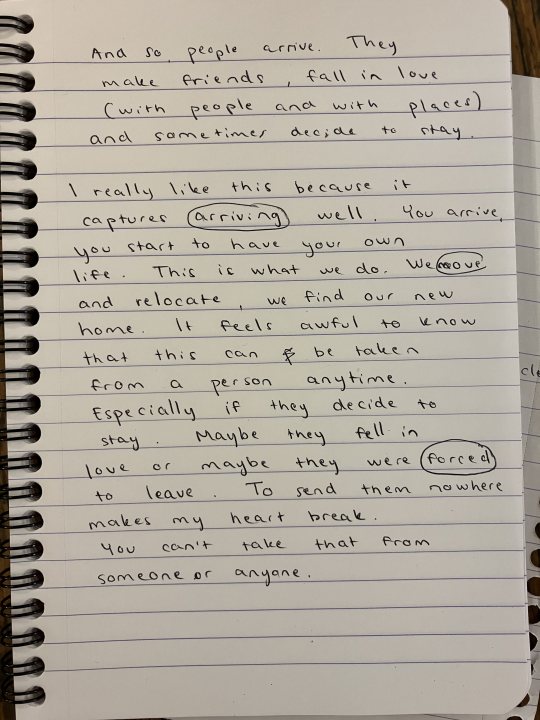
kim chi's writing practice (8 apr 2024)
activity: 1) read an excerpt from against borders: the case for abolition by gracie mae bradley & luke de noronha 2) find a sentence or phrase as a prompt/starting point of free writing 3) circle 2 words in your writing that suggest actions, movements, body parts, directions, sensations or feelings.
“and so, people arrive. they make friends, fall in love (with people and with places) and sometimes decide to stay.”
i really like this because it captures arriving well. you arrive, you start to have your own life. this is what we do. we move and relocate. we find our new home. it feels awful to know that this can be taken from a person anytime. especially if they decide to stay. maybe they fell in love or maybe they were forced to leave. to send them nowhere makes my heart break. you can't take that from someone or anyone.
0 notes
Text
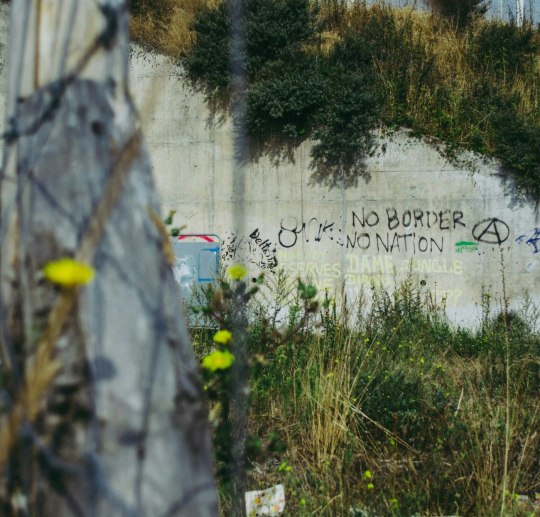
june's writing practice (8 apr 2024)
activity: 1) read an excerpt from against borders: the case for abolition by gracie mae bradley & luke de noronha 2) find a sentence or phrase as a prompt/starting point of free writing 3) circle 2 words in your writing that suggest actions, movements, body parts, directions, sensations or feelings.
“and so, people arrive. they make friends, fall in love and sometimes decide to stay.”
sometimes people depart, move, arrive, and decide to stay. how do people decide to stay? when do people desire to stay? how do people fall in love? how do people fall out of love? what lives in between arrival and departure? between love and the falling out of it? can it be measured by distance? by the passing of time? people move and fall in love and fall out of love and then perhaps fall in love again, and again and again and again. what is the border of loving, of staying, of departing and of unloving? what makes us lovers and what makes us not? so many arrivals and departures -- so many hearts staying and leaving and falling in and out. what do borders mean to lovers?
image: amaliah
[image description: a photograph of a border wall behind tall grasses and bushes. on the wall, the graffiti reads "no border. no nation," with an anarchy symbol next to it. the wall is also partially covered by grass on the top.]
0 notes
Text
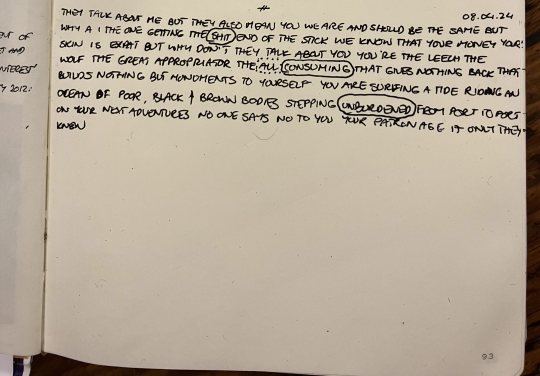
duane's writing practice (8 apr 2024)
"they talk about me but they also mean you we are and should be the same but why a[m] i the one getting the shit end of the stick we know that your money your skin is exalt but why don't they talk about you you're the leech the wolf the great appropriator the all consuming that give nothing back that builds nothing but monuments to yourself you are surfing a tide riding an ocean of poor, black & brown bodies stepping unburdened from port to port on your next adventures no one says no to you your parentage if only they knew."
0 notes